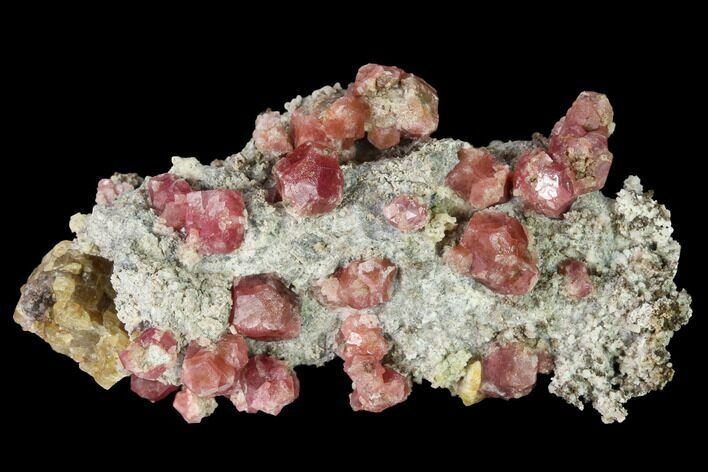This Specimen has been sold.
2.7" Raspberry, Grossular Garnets and Vesuvianite - Mexico
This is a 2.7" wide specimen that contains raspberry-red grossular garnets and yellow-orange vesuvianite crystals throughout the matrix, collected from Sierra de Cruces, Mexico. It comes with an acrylic display stand.
The colors that grossular garnets typically display range from yellow, green, brown, and in some cases a pale-pink color: deeper red colors are extremely rare. However, in the late 90s, raspberry-red garnets were discovered at a locality known as Sierra de Cruces, Coahuila, Mexico. This color had previously never been documented in natural grossular garnets. These garnets are also frequently sold under the name rosolite.
An in-depth study conducted on these garnets can be found here:
Raspberry-red grossular from Sierra de Cruces Range, Coahuila, Mexico
An in-depth study conducted on these garnets can be found here:
Raspberry-red grossular from Sierra de Cruces Range, Coahuila, Mexico
Garnets are nesosilicates with the general formula X3Y2(SiO4)3. Garnets come in many species, including pyrope, almandine (the most common species), spessartine, uvarovite, andradite and grossular, varieties of which are hessonite, cinnamon-stone, and tsavorite. Garnets are found in a wide variety of colors including red, orange, yellow, green, purple, brown, blue, black, pink, and colorless, though reddish shades are the most common.
About Vesuvianite
Vesuvianite, also known as idocrase, is a green, brown, yellow, or blue silicate mineral. Vesuvianite occurs as tetragonal crystals in skarn deposits and limestones that have been subjected to contact metamorphism. It was first discovered within included blocks or adjacent to lavas on Mount Vesuvius, hence its name. Attractive-looking crystals are sometimes cut as gemstones.
Vesuvianite, also known as idocrase, is a green, brown, yellow, or blue silicate mineral. Vesuvianite occurs as tetragonal crystals in skarn deposits and limestones that have been subjected to contact metamorphism. It was first discovered within included blocks or adjacent to lavas on Mount Vesuvius, hence its name. Attractive-looking crystals are sometimes cut as gemstones.
SPECIES
Grossular var. Rosolite
LOCATION
Sierra de Cruces, Coahuila, Mexico
SIZE
2.7 x 1.4"
CATEGORY
SUB CATEGORY
ITEM
#168315
 Reviews
Reviews














